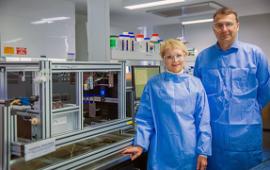Dragonfly wings capture place for Swinburne researchers in prestigious award

In Summary
- Professors Elena Ivanova and Saulius Juodkazis named finalists in the 2017 UNSW Eureka Prize for Scientific Research
- Mimicking the surfaces of dragonfly and cicada wings they developed a new form of self-sterilising material
- It presents a potential new weapon in the fight against antibiotic resistant bacteria
The development of a new weapon in the fight against antibiotic resistant bacteria has seen Swinburne researchers, Professor Elena Ivanova and Professor Saulius Juodkazis, named as finalists in the prestigious 2017 UNSW Eureka Prize for Scientific Research
In a novel approach to the growing epidemic of antibiotic resistant bacteria, Professors Ivanova and Juodkazis studied the wings of cicadas and dragonflies to determine how their surfaces resisted pathogens.
In particular they were studying the bacteria, Pseudomonas aeruginosa, which the World Health Organization has named second on its global list of antibiotic resistant pathogens urgently requiring a new form of treatment.
The scientists discovered that tiny spikes – called nano-pillars – on the surface of the cicada and dragonfly wings provided physical resistance to the bacteria.
When the bacteria became caught on the tips of the nano-pillars, it stretched and ruptured.
Mimicking the highly textured surfaces of these insect wings, the scientists developed a new form of nano-material constructed out of metallic materials with tiny self-sterilising protrusions.
They found that the material killed bacteria it came into contact with.
According to Professor Ivanova, it is possible to construct biomedical implants covered in these nano-pillars that could attract and kill the bacteria present in a patient.
“Because this is a mechanical process it’s less likely that the bacteria will be able to develop resistance to this material,” she says.
“We are now looking forward to commercialisation of our antibacterial surfaces to allow an antimicrobial nano-surface to be engineered onto existing medical devices, including implants,” she says.
Read more about Professor Ivanova’s research.
Read more about Professor Juodkazis’s research.
The Eureka Prizes will be announced on 30 August.

